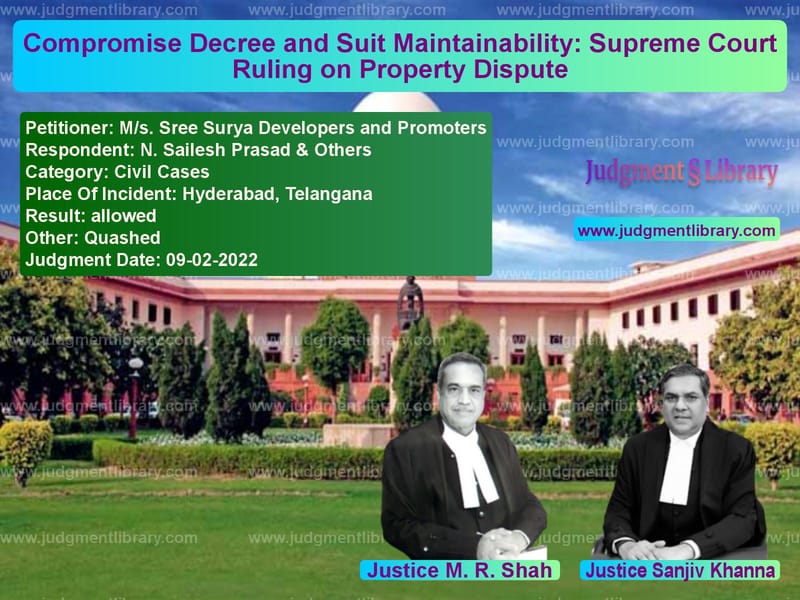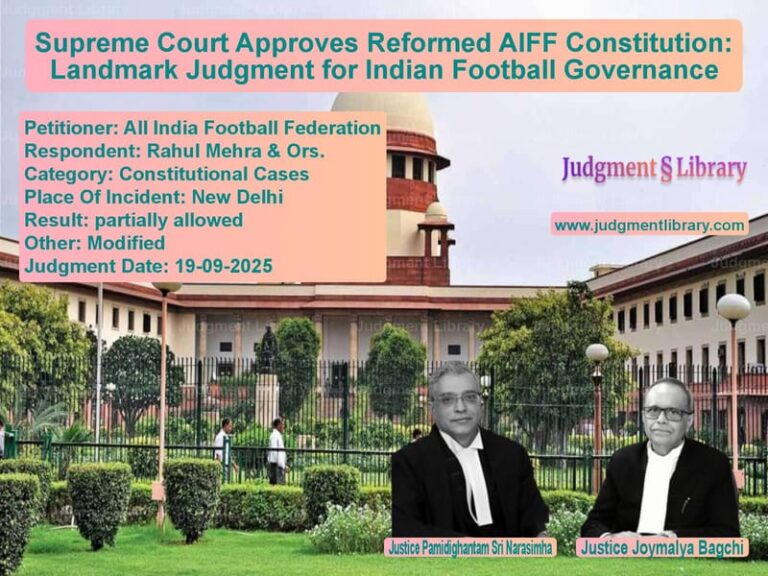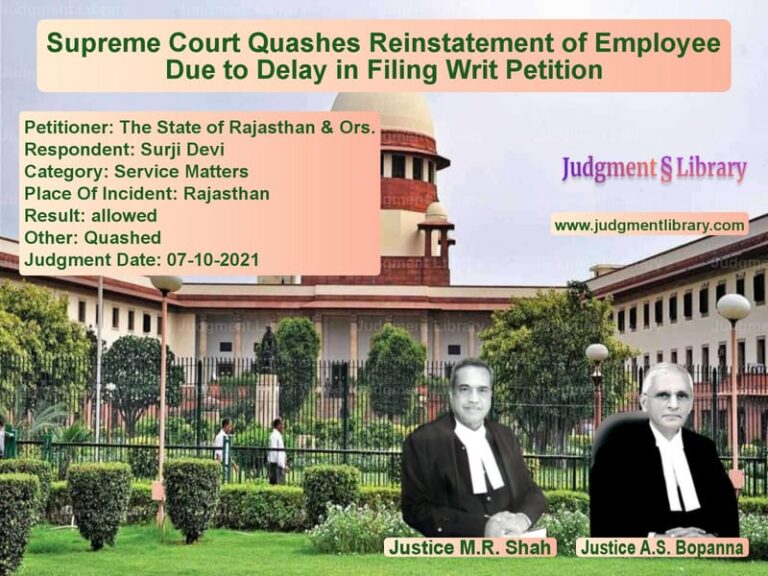Compromise Decree and Suit Maintainability: Supreme Court Ruling on Property Dispute
The case of M/s. Sree Surya Developers and Promoters vs. N. Sailesh Prasad & Others deals with the question of whether an independent suit challenging a compromise decree is maintainable under Order XXIII Rule 3A of the Civil Procedure Code (CPC). The Supreme Court had to determine whether a suit seeking to invalidate a compromise decree was legally permissible or whether the only remedy available was to approach the same court that issued the decree.
The ruling clarifies that once a compromise decree is passed, a separate suit to challenge it is barred, and any grievances must be raised before the same court that issued the decree.
Background of the Case
The dispute revolves around a property transaction in which respondent No.1, N. Sailesh Prasad, received the suit property as a gift from his paternal grandmother through a registered Gift Deed dated 13.02.2003. However, the grandmother later revoked the gift deed on 10.12.2004 and entered into a Development Agreement with M/s. Sree Surya Developers and Promoters (appellant).
A legal dispute arose when the father of respondent No.1, acting as his guardian (as he was a minor at the time), filed a suit challenging the revocation of the gift deed. The parties eventually arrived at a compromise, which was recorded as a decree by the trial court in O.S. No. 1750 of 2015.
After attaining majority, respondent No.1 filed a fresh suit, O.S. No. 537 of 2018, challenging the validity of the compromise decree, arguing that it was executed without his consent. The trial court rejected the suit under Order VII Rule 11(d) CPC, citing that it was barred under Order XXIII Rule 3A CPC, which prohibits independent suits challenging a compromise decree.
However, the High Court set aside the trial court’s order, reasoning that the provisions of Order XXXII Rules 1 to 7 CPC, which deal with suits involving minors, had not been considered. The matter was then brought before the Supreme Court.
Legal Issues Before the Supreme Court
- Can an independent suit be filed to challenge a compromise decree, or must the aggrieved party seek relief in the same court that passed the decree?
- Did the High Court err in setting aside the trial court’s rejection of the suit under Order VII Rule 11 CPC?
- What is the impact of Order XXXII Rules 1 to 7 CPC on the validity of a compromise decree involving a minor?
Arguments Before the Supreme Court
Appellant’s Arguments
The appellants, represented by their counsel, argued:
- Order XXIII Rule 3A CPC explicitly bars independent suits challenging a compromise decree, and the only remedy available is to approach the same court that recorded the compromise.
- The trial court correctly rejected the suit, but the High Court wrongly considered the validity of the compromise decree instead of focusing on the maintainability of the suit.
- The plaintiff had already moved an application before the same court challenging the compromise decree, making the fresh suit unnecessary and an abuse of process.
- The High Court failed to recognize that clever drafting of multiple reliefs does not make a barred suit maintainable.
Respondent’s Arguments
The respondent, N. Sailesh Prasad, argued:
- The compromise decree was obtained in violation of Order XXXII Rule 7 CPC, which protects minors from entering into agreements that are not in their best interest.
- As the compromise decree was executed when the plaintiff was a minor, he had the right to challenge it upon attaining majority.
- The suit was not solely for setting aside the compromise decree but also included other reliefs, making it maintainable.
- Order XXIII Rule 3A CPC does not apply when fundamental rights under Order XXXII are violated.
Supreme Court’s Judgment
The Supreme Court ruled in favor of the appellants, restoring the trial court’s order rejecting the suit. The key findings were:
- Order XXIII Rule 3A CPC bars an independent suit challenging a compromise decree. The only remedy is to challenge it before the court that passed the decree.
- The High Court erred by delving into the validity of the compromise decree instead of addressing the maintainability of the suit.
- Order XXXII Rule 7 CPC, which protects minors, does not override the bar imposed by Order XXIII Rule 3A CPC.
- The plaintiff had already filed an application before the same court that passed the decree, making the separate suit redundant.
The Supreme Court observed:
“If a suit challenging a compromise decree is barred under Order XXIII Rule 3A CPC, the aggrieved party must seek redress before the same court that recorded the compromise. Clever drafting of additional reliefs does not make an otherwise barred suit maintainable.”
Key Observations from the Judgment
- Bar on Independent Suits: Courts must strictly enforce Order XXIII Rule 3A CPC to prevent multiplicity of litigation.
- Limited Scope of Review: The validity of a compromise decree should be challenged before the same court that issued it, not through a new suit.
- Judicial Economy: Allowing independent suits against compromise decrees would lead to endless litigation and undermine judicial efficiency.
- Protection of Minors: While Order XXXII provides safeguards for minors, it does not override the procedural bar in Order XXIII Rule 3A CPC.
Impact of the Judgment
This ruling has significant implications for property disputes and compromise decrees:
- For Property Litigants: Reinforces the finality of compromise decrees and limits the scope of future legal challenges.
- For Legal Practitioners: Highlights the importance of ensuring that compromise agreements comply with procedural laws, especially when minors are involved.
- For Courts: Encourages courts to reject cleverly drafted suits that attempt to circumvent legal restrictions.
- For Minors in Litigation: While minors have protections, they must challenge a compromise decree within the prescribed legal framework.
Conclusion
The Supreme Court’s ruling in M/s. Sree Surya Developers and Promoters vs. N. Sailesh Prasad & Others upholds the principle that a compromise decree cannot be challenged through an independent suit. The judgment ensures that legal disputes are resolved efficiently and prevents parties from bypassing procedural safeguards through clever legal drafting.
This decision serves as a crucial precedent for handling compromise decrees, reinforcing that legal challenges must follow the proper procedural channels to maintain judicial integrity.
Petitioner Name: M/s. Sree Surya Developers and Promoters.Respondent Name: N. Sailesh Prasad & Others.Judgment By: Justice M. R. Shah, Justice Sanjiv Khanna.Place Of Incident: Hyderabad, Telangana.Judgment Date: 09-02-2022.
Don’t miss out on the full details! Download the complete judgment in PDF format below and gain valuable insights instantly!
Download Judgment: ms.-sree-surya-deve-vs-n.-sailesh-prasad-&-supreme-court-of-india-judgment-dated-09-02-2022.pdf
Directly Download Judgment: Directly download this Judgment
See all petitions in Contract Disputes
See all petitions in Property Disputes
See all petitions in Judgment by Mukeshkumar Rasikbhai Shah
See all petitions in Judgment by Sanjiv Khanna
See all petitions in allowed
See all petitions in Quashed
See all petitions in supreme court of India judgments February 2022
See all petitions in 2022 judgments
See all posts in Civil Cases Category
See all allowed petitions in Civil Cases Category
See all Dismissed petitions in Civil Cases Category
See all partially allowed petitions in Civil Cases Category







